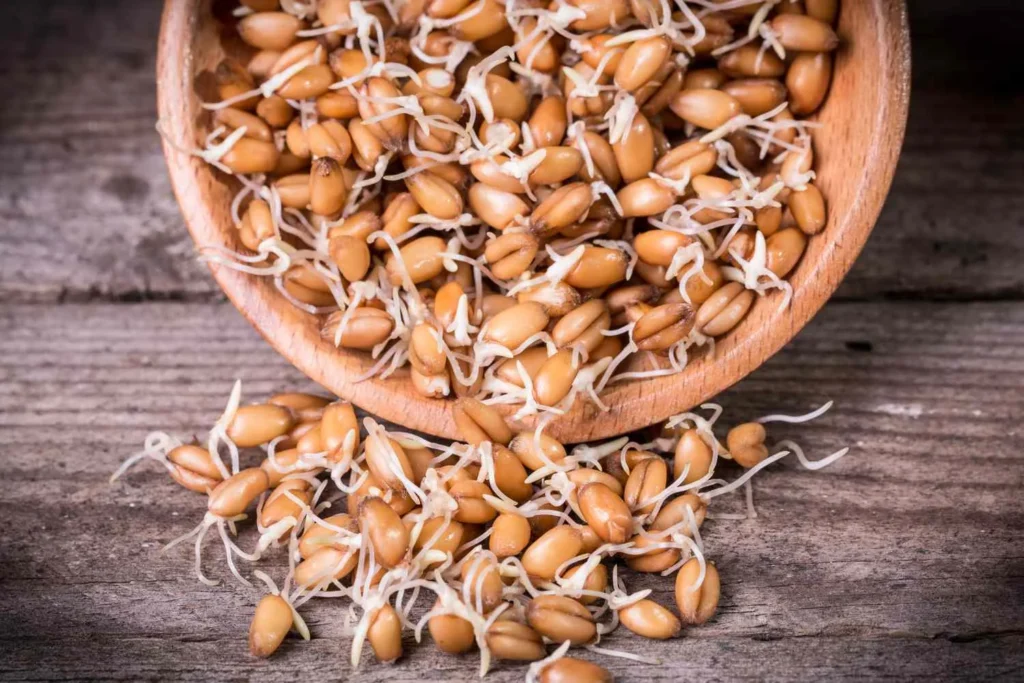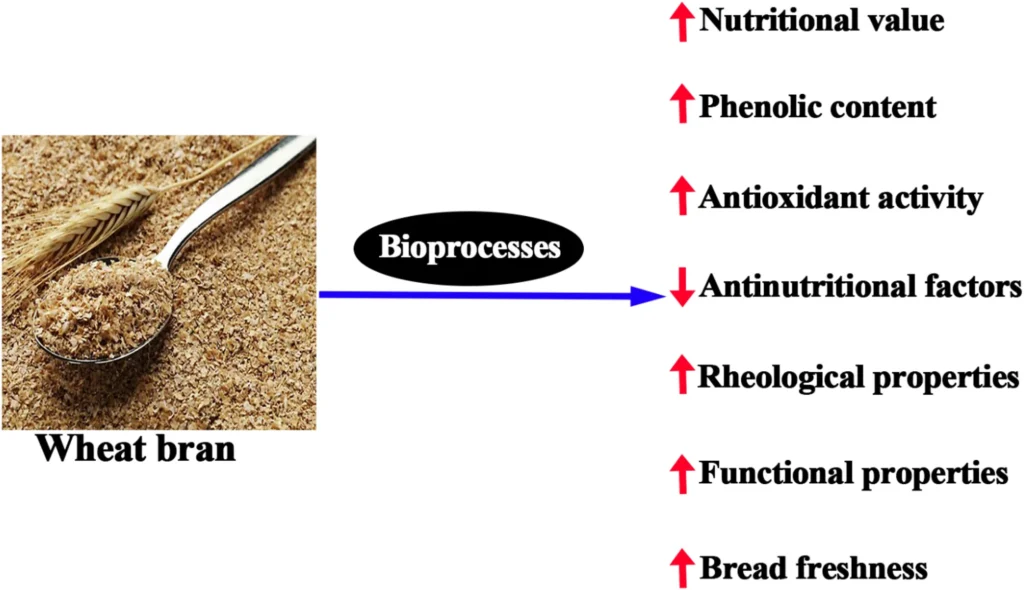In the world of natural supplements, few can match the dense nutritional profile of wheat germ extract. Derived from the very heart of the wheat kernel—the embryo—this powerful concentrate is more than just a byproduct of milling. It’s a repository of essential vitamins, minerals, healthy fats, and unique bioactive compounds that offer a surprising range of health benefits.
But navigating the claims surrounding it can be confusing. What’s the difference between the oil and the extract? Is it safe for everyone? And what about the compelling research on a special fermented version?
This guide will provide clear, science-backed answers to all these questions. We’ll delve into its core benefits, explore its exciting applications, and provide the critical safety information you need to make an informed decision.
Quick Takeaways:
- Nutrient-Dense: Rich in Vitamin E, B vitamins, zinc, magnesium, and healthy fats.
- Heart & Immune Support: Helps manage cholesterol and supports a robust immune system.
- Skin Health: A powerful ingredient for moisturizing and protecting the skin.
- Spermidine Source: One of the best natural sources of spermidine, a compound linked to cellular renewal and longevity.
- Gluten Warning: Contains gluten. It is unsuitable for individuals with celiac disease or gluten sensitivity.
What Is Wheat Germ Extract? The Nutrient Powerhouse Explained
The wheat kernel consists of three parts: the bran (fiber-rich outer layer), the endosperm (starchy middle part), and the germ (the embryo). The germ, though only making up about 2-3% of the kernel’s weight, is where the vast majority of its nutrients are stored. It’s the life force of the seed, containing everything needed to sprout into a new plant.
Wheat germ extract is a concentrated form of these nutrients. Its impressive profile includes:
- Vitamin E (Alpha-Tocopherol): A potent antioxidant that protects cells from oxidative stress.
- B Vitamins: Including folate, thiamin (B1), and vitamin B6, crucial for energy metabolism and brain function.
- Minerals: An excellent source of zinc, magnesium, phosphorus, and selenium, which are vital for immunity, bone health, and hundreds of enzymatic reactions.
- Healthy Fats: Rich in omega-3 (alpha-linolenic acid) and omega-6 fatty acids.
- Spermidine: A polyamine compound that plays a critical role in cellular health and aging.
The Core Difference: Extract vs. Oil vs. Fermented Extract (FWGE)
One of the biggest points of confusion for consumers is the variety of forms available. Each has a distinct purpose.
| Form | Description | Primary Use | Key Feature |
| Wheat Germ Extract | A powdered or liquid concentrate of the whole germ. | General health supplement, nutritional boosting. | Broad spectrum of nutrients (vitamins, minerals, protein). |
| Wheat Germ Oil | Cold-pressed oil from the germ. | Skincare (topical), dietary supplement (capsules). | Extremely high in Vitamin E and essential fatty acids. |
| Fermented (FWGE) | A standardized, patented extract (e.g., Avemar). | Medical food for specific health conditions (e.g., cancer support). | Immune-modulating properties studied in clinical research. |
Top 7 Science-Backed Benefits of Wheat Germ Extract
1. Boosts Your Immune System
A strong immune system requires a steady supply of key nutrients, and wheat germ extract delivers. It is packed with zinc, a mineral essential for the development and function of immune cells like T-cells. Its high antioxidant content, particularly Vitamin E and selenium, also helps protect immune cells from damage, allowing them to function optimally.
2. Supports a Healthy Heart
Wheat germ extract contributes to cardiovascular health in several ways. Its content of phytosterols can help lower the absorption of dietary cholesterol. Furthermore, the omega-3 fatty acids it contains are known to have anti-inflammatory effects and can contribute to maintaining healthy blood pressure and triglyceride levels, reducing the overall risk factors for heart disease.
3. A Powerful Ally for Your Skin
Used both topically (as an oil) and internally, wheat germ extract is a champion for skin health. Its incredibly high Vitamin E content helps protect skin cells from damage caused by UV radiation and environmental pollutants. The essential fatty acids help strengthen the skin’s barrier, locking in moisture and preventing dryness. This makes it an excellent ingredient for soothing dry, irritated skin and potentially improving the appearance of scars and blemishes.
4. Aids in Digestive Health
As a good source of dietary fiber, wheat germ extract can promote digestive regularity. Fiber adds bulk to the stool, preventing constipation and maintaining a healthy gut environment. This, in turn, supports the microbiome, the community of beneficial bacteria in your gut that influences everything from digestion to immunity.
5. May Help Regulate Blood Sugar
The fiber in wheat germ extract also plays a role in blood sugar management. It slows down the absorption of carbohydrates, preventing the sharp spikes in blood glucose that can occur after a meal. This effect, combined with its magnesium content—a mineral involved in insulin sensitivity—makes it a beneficial addition for those looking to maintain stable energy levels and support metabolic health.
6. Provides Cellular Energy and Fights Fatigue
The B vitamins in wheat germ are metabolic powerhouses. Thiamin, folate, and B6 are coenzymes that help your body convert food (carbohydrates, fats, and proteins) into usable energy (ATP). A sufficient intake of these vitamins is essential for fighting fatigue and maintaining optimal physical and mental energy throughout the day.
7. The Spermidine Effect: Promoting Cellular Renewal and Longevity
This is perhaps one of the most exciting areas of wheat germ research. Wheat germ is one of the richest natural sources of a compound called spermidine. Spermidine is a potent activator of autophagy.
Think of autophagy as your body’s cellular “housekeeping” service. It’s a natural process where cells identify and break down their old, damaged, or dysfunctional components, recycling them for energy or new cell parts. This process is fundamental for keeping cells young and healthy. As we age, autophagy naturally declines. By boosting this process, spermidine is believed to contribute to healthier aging, improved organ function, and increased longevity.
A Special Focus: Fermented Wheat Germ Extract (FWGE) and Cancer Research
A specific, standardized form known as Fermented Wheat Germ Extract (FWGE) has been the subject of extensive scientific research, particularly as a complementary therapy for cancer patients. Marketed under the brand name Avemar, this medical food has been studied in numerous clinical trials.
Research suggests FWGE works not by directly killing cancer cells, but by:
- Modulating the Immune System: It helps the body’s own immune system to better recognize and target malignant cells.
- Interfering with Cancer Cell Metabolism: It appears to inhibit glucose uptake by cancer cells, essentially starving them of the energy they need to proliferate.
Studies have investigated its use alongside conventional treatments like chemotherapy for various cancers, including colorectal, breast, and melanoma. Some results have shown potential benefits in improving quality of life, reducing treatment-related side effects, and even improving survival rates in some patient groups.
Crucial Disclaimer: FWGE is classified as a medical food, intended to be used under medical supervision. It is NOT a cure for cancer and should never be used as a replacement for standard medical treatments like chemotherapy, radiation, or surgery. Any cancer patient considering FWGE must discuss it with their oncologist first.
Safety First: Side Effects and Who MUST Avoid Wheat Germ Extract
While generally safe for most people, the following considerations are critical.
⚠️ Warning for Gluten Sensitivity and Celiac Disease
This is the most important safety concern. As its name implies, wheat germ extract is derived from wheat and contains gluten. Individuals with celiac disease, gluten intolerance, or a wheat allergy must avoid this supplement in all its forms.
Potential Side Effects
The most common side effects are mild and gastrointestinal in nature, including:
- Diarrhea
- Nausea
- Gas and bloating
- Indigestion
These often occur when starting the supplement and may resolve as your body adjusts.
Contraindications: Who Should Not Use It
- Organ Transplant Recipients: Because of its immune-boosting properties, it could potentially interfere with anti-rejection medications.
- Pregnant or Breastfeeding Women: There is insufficient safety data for this group, so it is best to avoid it.
- Those on Specific Medications: Consult your doctor before use if you are taking blood thinners or other medications, as nutrient-dense supplements can sometimes cause interactions.
How to Choose and Use Wheat Germ Extract
- Reading the Label:
- For Oil: Look for “cold-pressed” and “unrefined” to ensure the delicate nutrients haven’t been damaged by heat.
- For Extract: Check for standardization to ensure a consistent concentration of active compounds.
- Purity: Choose products from reputable brands that perform third-party testing for purity and contaminants.
- General Dosage Guidelines: Dosage varies widely depending on the form and purpose. Always follow the manufacturer’s recommendation on the product label. It is not a medication, and there is no official “Recommended Daily Allowance.” A conversation with a healthcare provider or registered dietitian is the best way to determine an appropriate amount for your needs.
Frequently Asked Questions (FAQ)
Is wheat germ extract the same as wheat germ oil?
No. The extract contains the full spectrum of nutrients (protein, fiber, vitamins, minerals), while the oil is a concentration of the fatty components, especially Vitamin E and essential fatty acids.
Can I get the same benefits from eating raw wheat germ?
Yes, eating raw or toasted wheat germ is a great way to get these nutrients. The extract is simply a more concentrated form, which can be more convenient for supplementation.
How long does it take to see benefits?
This depends on the individual and the benefit being sought. Nutritional improvements can be systemic and gradual. Some skin benefits from topical oil application might be noticeable within a few weeks.
The Bottom Line: Is Wheat Germ Extract Worth It?
For the right person, wheat germ extract is an exceptionally valuable supplement. It offers a holistic, nutrient-rich approach to supporting long-term health, from your heart and immune system to the very cells that make up your body. Its role as a potent source of skin-loving Vitamin E and cell-renewing spermidine makes it particularly compelling.
However, its value is entirely dependent on safe and appropriate use. It is a firm “no” for anyone with gluten-related disorders. For others, particularly those considering the specialized fermented form for serious health conditions, a dialogue with a healthcare professional isn’t just recommended—it’s essential.
For Further Reading and Research
To explore the science behind wheat germ extract and its components, consult these authoritative sources:
Memorial Sloan Kettering Cancer Center (MSKCC): Provides a detailed, evidence-based overview of Fermented Wheat Germ Extract.
MSKCC – Fermented Wheat Germ Extract
National Institutes of Health (NIH) – Office of Dietary Supplements: Offers fact sheets on many of the key nutrients found in wheat germ, such as Vitamin E and Zinc.
NIH – Vitamin E Fact Sheet for Health Professionals
Examine.com: An independent resource that collates and analyzes scientific research on supplements, including Wheat Germ.
PubMed: A searchable database of biomedical literature from the U.S. National Library of Medicine, where you can find original research papers on spermidine, FWGE, and more.




